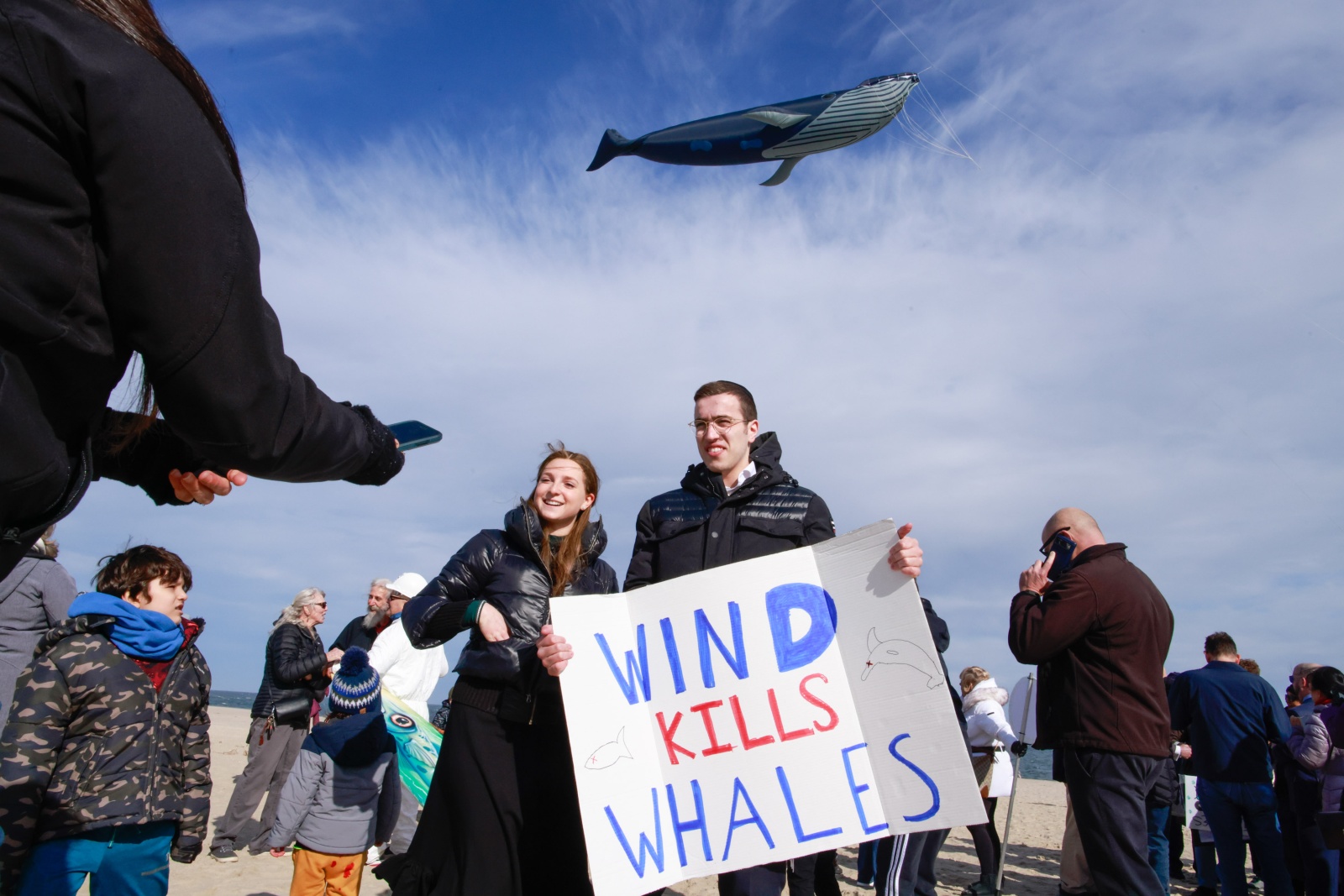Last month, House Republicans pushed through an energy package to rival President Joe Biden’s landmark climate law, the 2022 Inflation Reduction Act. The GOP legislation — pronounced “dead on arrival” in the Democratically controlled Senate by Senate Majority Leader Chuck Schumer — aimed to ease restrictions on oil and gas production and repeal key emissions-slashing provisions in Biden’s climate spending bill.
The bill is unlikely to become law, but it sheds light on Republicans’ uneasy relationship with renewable energy — and specifically, with offshore wind. The legislation featured a few last-minute provisions that reflect disagreements among congressional conservatives on the future of offshore wind. Some GOP lawmakers say, without evidence, that the emerging industry has caused a recent surge in whale deaths, while others support wind development in the Gulf of Mexico.
Meanwhile, major Republican donors are behind a growing misinformation campaign to slow the sector down. The organized opposition may present new obstacles to the future of offshore wind, a clean energy source identified by the Biden administration as critical to the energy transition.
Offshore wind turbines, which can soar up to three times the height of the Statue of Liberty, take advantage of the higher wind speeds at sea to produce more electricity per turbine than onshore wind. Although the U.S. only has two offshore wind farms in operation, in other parts of the world the sector is robust and mature. China, the United Kingdom, and Germany hold a combined 172 offshore wind farms.
Biden has pinpointed offshore wind as a critical renewable energy source for hitting U.S. climate targets. The administration wants to install 30 gigawatts of offshore wind power generation by 2030, enough to power 10 million homes. Most offshore wind projects in development are located along the Northeast and Mid-Atlantic coasts.
But those projects have faced controversy in recent months. Since December, 30 dead whales have washed ashore along the Atlantic coast. The recent events follow a disturbing pattern that began in 2016, which the National Oceanic and Atmospheric Administration, or NOAA, describes as an “unusual mortality event.”
Republicans have claimed that the deaths are linked to offshore wind development. Amendments in the House energy bill would have required the Government Accountability Office to study the potential impacts of offshore wind on tourism, military activities, and marine wildlife. “Like the canary in the coal mine, the recent spate of tragic whale deaths shed new light and increased scrutiny to the fast-tracking of thousands of wind turbines off our coast,” said Representative Chris Smith, a Republican from New Jersey, at a hearing in March.
But according to NOAA, a federal agency that conducts marine research, offshore wind is probably not at fault for the casualties. “At this point, there is no evidence to support speculation that noise resulting from wind development-related site characterization surveys could potentially cause mortality of whales, and no specific links between recent large whale mortalities and currently ongoing surveys,” NOAA’s website says.
Instead, the agency states that “the greatest human threats to large whales” are vessel strikes and entanglement in fishing gear. Examinations of about half the humpback whales stranded since 2016 attributed 40 percent of the deaths to either of the two causes. (The other half of the beached whales were too decomposed to analyze.)
A few bigger trends could be behind the increase in whale mortality. One is climate change — warming waters have pulled small fish closer to shore, which also draws in whales hunting food. Fishers looking to catch those same fish tend to follow closely behind, leading to a greater risk of collision between boats and whales.
Another obvious source of whale and vessel strikes is the growing global shipping industry. In 2020, almost 15,000 ships sailed through the Port of New York and New Jersey alone. “Collisions involving ships and whales tend to occur around areas with the greatest commercial shipping traffic,” according to NOAA.
To reduce collision risk, the agency and major environmental groups like the Natural Resources Defense Council advocate for tighter restrictions on vessel speed. But Republicans’ proposed policies have made no mention of this evidence-based solution for protecting whales and other wildlife.
Representative Jared Huffman, a Democrat from California, points out that Republicans have failed to throw their weight behind other previous proposed bills to protect whales. “But this interest in whales just suddenly springs up when offshore wind is starting to take off and threaten fossil fuels,” he told E&E News.

In addition to drawing criticism from Republicans in Congress, offshore wind has also inspired opposition from multiple campaigns by local nonprofit groups claiming that the industry harms whales. But some of these are actually backed by powerful oil and gas interests, including the fossil fuel billionaire Koch brothers and other major Republican donors.
Fast Company traced funding for nonprofits like Protect Our Coast New Jersey, Save Our Beach View, and the Long Beach Island Coalition for Wind Without Impact — anti-wind groups claiming to be grassroots — back to the Caesar Rodney Institute. The think tank receives money from industry groups including the American Fuel and Petrochemical Manufacturers and the American Energy Alliance.
Recent lawsuits launched against offshore wind projects have also been linked to fossil fuel entities. In 2021, attorneys at the conservative Texas Public Policy Foundation filed a lawsuit on behalf of a group of fishing companies challenging Vineyard Wind, the first major offshore wind project off the coast of Massachusetts. The Austin-based foundation counts among its funders Charles Koch, Exxon Mobil, Chevron, and ConocoPhillips — all major Republican donors.
Another lawsuit brought against Vineyard Wind is led by the Nantucket Residents Against Wind Turbines, another purportedly grassroots campaign that is backed by David Stevenson, a director at the Caesar Rodney Institute.
Stevenson also leads a group called the American Coalition for Ocean Protection, which supports efforts to launch a lawsuit aiming to stop a Dominion Energy offshore wind project off the coast of Virginia.
Democratic lawmakers have drawn attention to the vested interests behind anti-wind sentiments. “I am 100 percent convinced that fossil fuel is funding some of the opposition,” Senator Sheldon Whitehouse, a Democrat from Rhode Island, told Axios. “Any clean energy, they want to find ways to hobble and harass.”
Despite the organized efforts from Republicans’ fossil fuel donors, not all Republicans in Congress oppose offshore wind. Some conservative lawmakers, particularly from states bordering the Gulf of Mexico, just want to make sure their states can cash in on incoming wind lease sales. Senator John Kennedy, a Republican from Louisiana, said to Axios that he opposes bans on the offshore wind industry. His own website highlights the inclusion of a provision in the GOP energy bill to ensure that 50 percent of federal lease revenues from offshore wind lease sales go to coastal states.

Jonathan Bachman / Getty Images
Megan Milliken Biven, a former staffer at the federal Bureau of Ocean Energy Management and the founder of the climate and labor advocacy organization True Transition, said that support isn’t a surprise. Her experiences with offshore industries on the Gulf Coast indicate that politicians on the coast of Louisiana are “very enthusiastic about offshore wind — Republicans and Democrats alike.”
That bipartisan support owes to the decline in oil and gas jobs in the state, including offshore jobs. Over the past decade, Louisiana’s oil and gas sector has become much more efficient, requiring fewer wells to extract more fossil fuels. “The service companies, the shipyards, the vessels — all these companies that used to serve oil and gas have less contracts,” Biven said. “Wind is the way to make sure that these companies stay viable. They see their future in offshore wind.”
A report from the University of Delaware found that the growing U.S. offshore wind industry holds an estimated $109 billion in potential profits to supply-chain businesses this decade.
So far, Republican opposition hasn’t blocked offshore wind growth. The Biden administration proposed the first offshore wind lease sale areas in the Gulf of Mexico in February. Offshore wind off the coast of Texas and Louisiana could power as many as 1.3 million homes. Eight states have set formal offshore wind procurement goals totalling 40 gigawatts by 2040 — enough to power roughly 12 million homes. And 18 projects in development in U.S. waters have already reached the permitting phase.
Yet it also doesn’t seem like the nagging lawsuits and criticism will blow over any time soon. Biven says approaching attacks on offshore wind requires building an effective counternarrative. “It’s always about who is telling the better story,” she said. “It’s a lot easier to mobilize people around a yes than a no.”
One easy “yes” for the average American is good-paying jobs. If offshore wind companies manage to provide “a good job that’s providing for their families, they’re paying local taxes, they’re contributing to their local church, they’re going to defend it,” Biven said. She says people could easily mobilize around the economic and job benefits of a growing offshore wind industry — but only if the federal government takes concrete measures to make those benefits an on-the-ground reality.
“We have an abundant resource to power our homes and our communities,” Biven said. “Do we want to take advantage of that or do we want to sit on our thumbs for another few decades because someone has manipulated us?”
Editor’s note: The Natural Resources Defense Council is an advertiser with Grist. Advertisers have no role in Grist’s editorial decisions.

